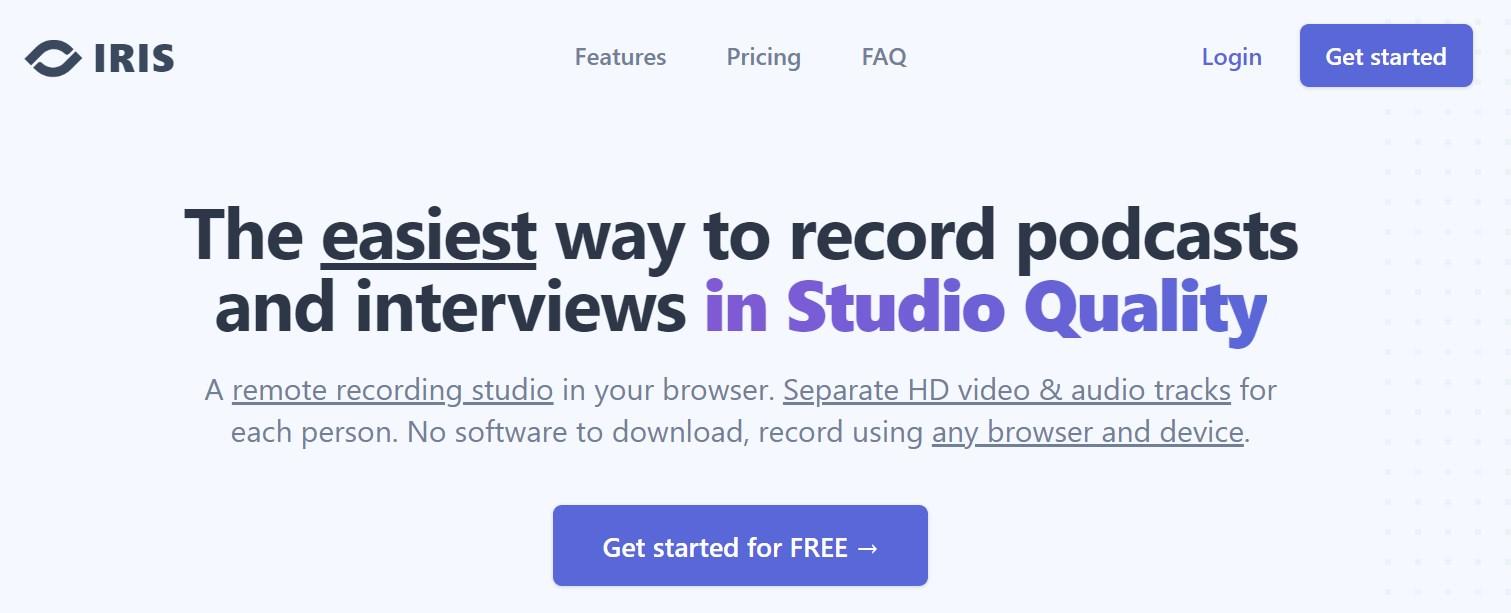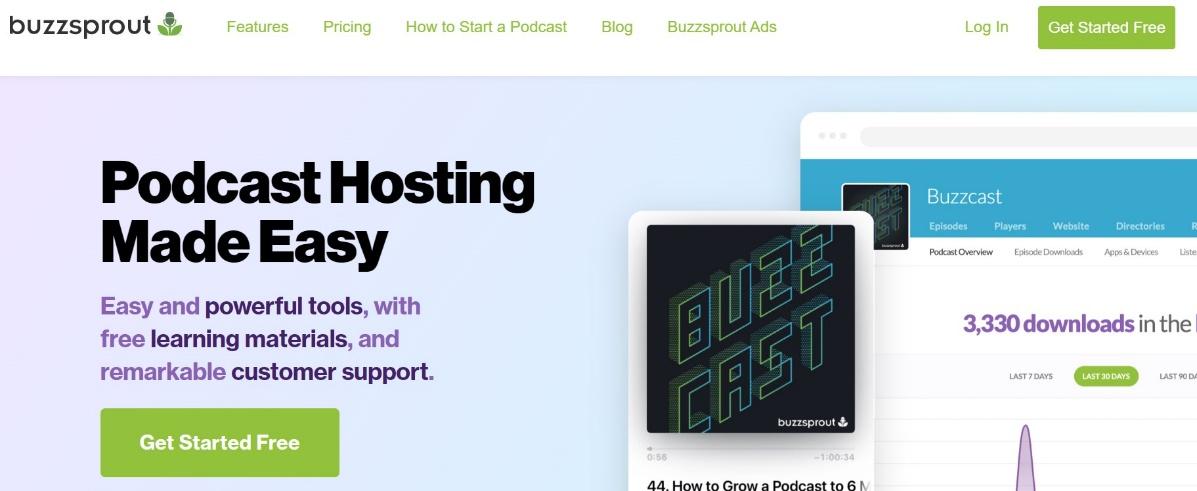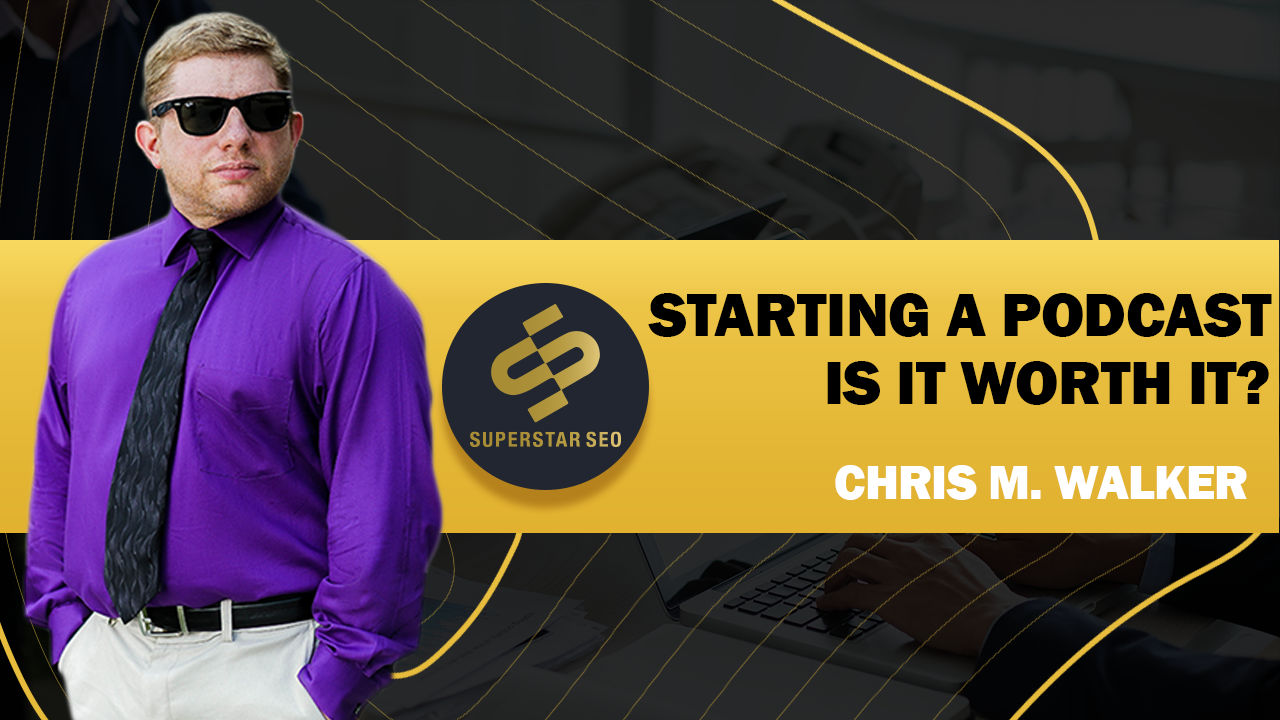Is Starting a Podcast Worth It In 2023
Podcasts are super easy to consume.
People can listen to them while carrying out day-to-day activities, like driving, resting, cooking, and more.
But, is starting a podcast worth it for content creators and business owners?
In this post, I’ll share:
- Reasons to start a podcast
- Scenarios when starting a podcast isn’t worth it
- How to start a podcast
Let’s get going.
Is Starting a Podcast Worth It – Everything You Need to Know

Reasons to Start a Podcast
There are plenty of reasons to start a podcast; let’s take a look at the most important ones.
Podcasts Are Getting Popular
Based on the data, we can see a clear upward trend in podcast consumption in the recent few years.
For instance, today, more than 30% of Americans (Over 104 million) consume podcasts on a regular basis.
Many businesses and entrepreneurs aren’t missing out on this marketing opportunity.
In 2019, Apply hosted a whopping 750,000 podcasts, which is a 36% increase from the previous year.
But, the good news is there’s still a lot of space in this industry.
So, if you’re thinking about starting a podcast, now would be the time to take action!
Learners Are Listeners
Now, the podcast industry is without a doubt one of the fastest-growing ones.
But, you need to know who is the main audience that’s driving this growth.
There’s no limit on the types of topics you can talk about on a podcast.
But, you’ll find a lot of learning enthusiasts listening to podcasts every day.
This means people aren’t listening to podcasts just for fun; they’re serious about the topics.
As an entrepreneur, you can convert that into a business opportunity by providing great content.
You Can Start a Podcast on a Budget
Starting a podcast doesn’t require a lot of investment either. Especially if you can create the content yourself.
All you need is a good-quality mic and software and awesome content.
If you don’t have the time for content creation, consider hiring someone to do it for you.
It doesn’t have to be an expensive agency; a freelancer can take care of everything on a budget.
Alternatively, if you have a blog or a YouTube channel, you can repurpose its content for your podcast.
The point is: You can start a podcast on a budget.
Growing an Existing Business with a Podcast

Another reason to start a podcast is that it can help you sell more of whatever you’re selling.
But, remember that people don’t listen to podcasts to buy anything.
So, your content needs to be super helpful and not salesy.
Your goal should be to establish your authority in the market; this will reduce the resistance associated with the buying process.
But, what if you don’t have a lot of ideas to build a successful podcast on?
You can interview industry leaders. This will also help you attract their audience and build your following.
Just like any other content marketing strategy, consistency is important in podcasting.
The more amazing content you provide, the higher traffic you can generate for your products or services.
Making Money with Podcasting

There are plenty of ways to monetize a podcast, even if you don’t have a product of your own.
Affiliate Marketing
Affiliate marketing refers to promoting products of other brands.
It’s a performance-based marketing model where you get a pre-determined commission for every sale.
Most popular brands have an affiliate program. And why not? They don’t have to invest anything upfront.
And the affiliate commission is typically very small, so brands have very little to lose.
As an affiliate, you only want to promote products or services you’ve personally used or are familiar with.
The nice thing is it’s easy to join affiliate programs in virtually any industry.
For instance, you can join Amazon’s affiliate program if you want to promote e-commerce products.
Alternatively, you can join a platform like Impact where you can apply to and promote a range of brands.
However, every platform\program can have unique terms and conditions. So, always make sure you abide by their rules.
Sponsorships
Sponsors are probably the most popular way of monetizing a podcast.
You can directly connect with advertisers and manage your contracts.
But, there are ad networks that can do all the heavy lifting for you, including:
- Finding advertisers
- Negotiating
- Getting the script
Alternatively, you can do the outreach, negotiation, and closing yourself.
Keep in mind that you’ll need more than 5000 podcast listeners per month to attract sponsorship deals.
Courses

One of the best ways to monetize a podcast is by selling related courses.
You don’t have to do a lot of extra work to create a course as a podcast host.
Repurpose your existing podcast content and create something of value.
You can even hire a freelancer to help you with content curation.
As previously mentioned, people generally listen to podcasts to learn something new.
So, if you succeed in building a decent-enough audience, your conversions as a course seller can be pretty high.
One of the best ways to sell courses online is by building an email list.
To build an email list, prompt listeners to sign up for your newsletter.
Most of your email newsletter content should be focused on informational and educational topics.
Services
You can even use your podcast to sell services.
For instance, let’s say your podcast is about helping people get more effective at online advertising.
Over time, your content establishes you as an authority in advertising.
As a result, it’d be easier for you to sell services like Facebook Ads and Google Ads management.
Even if you don’t want to get into the technicalities, you can outsource these services on platforms like Legiit cost-effectively.
Of course, you don’t have to limit yourself to advertising; just make sure whatever you’re selling is related to what you’re talking about.
Podcasts Help You Build Credibility in Your Industry
Effective content marketing helps businesses sell more of whatever they’re selling because:
It helps them build credibility in their market.
Because you’re helping listeners with your audio content, podcasts are also a form of content marketing.
The more credible your business looks, the higher conversions it’ll be able to generate.
There’s Lower Competition
Here’s why businesses who’re thinking about jumping on the bandwagon of podcasting must act now:
There’s little competition.
Compare podcasting with other content marketing strategies like blogging and YouTube and you’ll get an idea.
There are more than 600 million blog posts on the internet, and plenty more are still going live.
You’ll see the same trend with YouTube videos. It’s getting super-hard to stand out with written and video content.
On the flip side, the podcast industry is still in its infancy. So, you’ll face lower competition, if at all, while building a following with a podcast.
Podcasts Are Easier to Consume
Another reason businesses should invest in podcasts is that they’re super easy to consume.
You don’t have to constantly stare at a screen to consume audio content.
People listen to podcasts while they’re:
- Driving
- Cooking
- Jogging
- And more
No wonder they’ve been growing like crazy in the past few years.
This just means that it’s easier to connect with a niche audience with podcasting.
Whether you’re selling your own products are want an extra income stream, podcasting would be the right way forward.
Help Build a Professional Network
You can build a professional network by interviewing different industry experts on your podcast.
There are two benefits of podcast interviews:
- They attract the interviewee’s audience, building your following
- They help you network with other industry experts
The best part is: A majority of your content comes from the person you’re interviewing.
All you’ll have to do is come up with interesting and relevant questions.
Now, there are several other reasons to start a podcast, let’s not go into all of them.
Let’s talk about the reasons to not start a podcast.
Or, scenarios when starting a podcast won’t do much good.
When Should You Not Start a Podcast?
You Want to Make Money Quick
Again, podcasting is a form of content marketing if you’re using it to promote something.
Content marketing doesn’t bring quick results; it’s more of a long-term strategy.
It’s not a get-rich-quick scheme, so if you’re looking to make quick bucks, podcasting isn’t for you.
You can’t expect blogging, YouTube, podcasting, and even social media marketing to generate quick results for you.
The natural first step, no matter what platform you’re using, is to offer valuable content to your audience.
And a lot of it, without expecting anything in return. This might sound repelling, but you gain a lot more in the long run.
Remember that most people listen to a podcast while doing something else. This means you shouldn’t expect them to take immediate action as soon as your podcast ends.
Of course, once you have a decent audience, you can earn quick bucks with sponsorships.
Generally, if you’re looking for a quick way to earn money, podcasting isn’t the way to do it.
You Don’t Have a Plan
The first thing you need to ask yourself before starting a podcast is, “Do I have a plan?”.
What do you want to achieve with your podcast?
Do you want to grow your audience as a brand?
Maybe you’re good at talking or interviewing, and want to cash that skill.
Don’t start a podcast just because someone told you it’s the new normal.
It could be anything, but you need to have a plan.
But, guess what? If you’re thinking of starting a podcast, you already have a plan, even if it’s a vague one.
In addition, you need the right equipment (high-quality mic, noise-canceling software).
And make sure you’re not too busy to give enough time to your podcast on a regular basis.
Lastly, have a marketing strategy. List all the ways you’ll be promoting your podcast and implement these strategies for every episode.
You Think it’s a Piece of Cake
This goes without saying, but to build an audience and sell anything, you need to put in the initial work.
Nothing comes easily, especially if you want people to spend money on your product.
I’m all about working smart, but there are no shortcuts to success.
If you want to build a niche audience, you need to offer consistent value with your content.
Remember that experiencing a phase of silence is normal in content marketing.
One way to not get demoralized by the slow progress is by having a second source of traffic or income.
This way, you won’t have to worry too much about your podcast not growing at the pace you want it to grow.
Having said that, building a podcast audience doesn’t have to be tough either.
The recipe for success here is in-demand, valuable content on a consistent basis.
You Don’t Have Any Presence Online
Starting a podcast with zero online presence isn’t a good idea.
It could be a blog, a YouTube channel, or a social media profile with a decent following.
This is because you’ll have an easier time getting people to listen to you when you already have some presence online.
Project yourself as an expert in your field and the listenership will follow.
This shouldn’t keep you from taking action, however.
If you don’t have any presence, you can start building it alongside your podcast.
You Don’t Want to Outsource
You don’t want to wear too many hats while building a business.
Starting and managing a podcast requires a lot of time.
So, outsourcing some of the work to an expert is always a better idea.
This way, you’ll have more time to brainstorm new growth opportunities.
The aspects of your podcast you can outsource are:
- Audio editing/enhancements: This can also include adding sound effects to make your podcast more appealing
- Marketing: You can let a freelancer market your podcast to the right audience
- General maintenance: You may want someone to make sure everything keeps working the way it’s supposed to
You can even outsource the topics and content of your podcast.
Of course, you’d want to do the most important parts yourself, like researching for your podcast, reaching out to a potential guest, and interacting with the audience.
How to Start a Podcast

Starting a podcast is easy, but you need to go through a few basic steps to set everything up.
In the next few sections, I’ll help you with:
- Topic selection
- Equipment selection
- Recording and Editing
- Uploading the podcast
- Promoting your newly launched podcast
Choose a Topic
Your podcast needs to be around a specific topic or niche.
But, although it’s important to not go too broad, you should be able to create 100+ episodes in your niche.
For instance, instead of catering everything under “Marketing”, go for “Social media marketing”.
Or, create a podcast on “Hiking” instead of “Outdoors”.
Choose a Name
When it comes to naming your podcast, you want to pick a relatively broad name.
This will allow you to broaden your niche later.
For instance, instead of sticking to hiking, you may want to talk about backpacking and camping in the future.
Once you have a few great ideas, check if the domain names are available and buy one.
Decide the Length of Episodes
The length of your podcast episodes depends on your topics.
You don’t want to drag your episodes just to reach a specific duration.
Neither should you shorten your episodes just because people have short attention spans.
Your focus should be to cover the topic comprehensively, no matter how long it takes.
You can, however, break a topic into multiple episodes.
Style
There are essentially three ways to host a podcast episode:
- Solo
- With a co-host
- Interview
Now, you don’t have to pick one style; an episode can be half solo (or co-hosted) and half interview.
Get a Microphone
The quality of a podcast’s audio is super important.
But, the good news is a good microphone doesn’t have to cost a lot.
You can always upgrade your gear as your podcast grows.
Podcast Guests
If you’re thinking about being a host on your podcast, you’ll need to reach out and interact with potential guests yourself.
Before that, make a list of people you want to appear on your podcast as guests.
Then, you can use a scheduling tool to book appointments at suitable times.
Recording and Editing
Once you know who’s the next guest on your podcast, it’s time to make sure everything will sound great.
While a good-quality microphone is a must, it’s not the only thing you need to ensure that.
Make sure there isn’t any distraction or unnecessary additions to your podcast.
This is where your audio editing skills will come in handy.
For this, you can use free software like Audacity or go with a premium one like Alitu.
The podcast maker automates most technical aspects of the podcast creation process.
Audio editing can be a bit technical, so you can always get a freelancer to do it for you at a reasonable rate.
Create a Template
Creating a template that you can reuse for every new episode can save a lot of your time down the road.
This just means setting up an intro and outro, allocating space for ads, and any other background sounds you may want to use repeatedly.
Create Your First Episode
This is where you’ll have to set up your software for recording.
Solo recordings don’t need much setup. You’ll just have to press the red recording button and speak into the mic from an appropriate distance.
If you’re going to interview someone, you’ll need to enable multiple track recordings in your software.
When it comes to remote interviews, a lot of people use Skype.
But, although it’s a great free option, you may want better audio quality and more flexibility.
This is where paid podcast software like Iris can help.

Editing Your Episode
There’s no universal setting when it comes to editing a podcast.
This is because everyone’s voice and requirements are unique.
The technicality of the process depends on your software, but it’s always a better idea to outsource this aspect to a professional.
You will have to provide detailed and clear instructions about your desired results.
If you’re doing it yourself, don’t over-analyze your files, just make sure the audio is loud and clear.
Host Your Podcast
By now, you’ll be ready to get your first podcast in front of the world.
But, you need a hosting service to publish your podcast on the internet.
Now, picking the right hosting platform can take hours of research work.
I’d recommend doing your own research on the best podcast hosting providers.
But, if you want a quick recommendation, Buzzsprout podcast hosting would be a great option.

Uploading Your Episode Files
With most professional podcast hosting services, uploading your episodes is super simple.
For instance, with Buzzsprout, you’ll just need to click “Upload a New Episode” and enter the basic information.
This includes the episode title, description, publish date, episode number, and summary.
Spread the Word
The best way to promote a podcast episode is by creating and sharing teaser videos.
Most top podcast hosting services offer this feature for free.
Tips on Promoting Your Podcast Episodes
- Create a Website: A professional website helps your credibility
- Get a Transcript: Written word helps search engines understand what your podcast is about, helping your organic rankings
- Embed Your Episodes: Embed your podcast episodes on your website or blog
Conclusion: Is Starting a Podcast Worth It
So, is starting a podcast worth it? Generally, yes!
But, should everyone start a podcast? No.
See, a lot goes into creating and managing a quality podcast.
You need to have a clear plan on what you want to eventually achieve with your podcast.
It takes time to build an audience, and your purpose will provide the motivation you need to keep moving forward.





